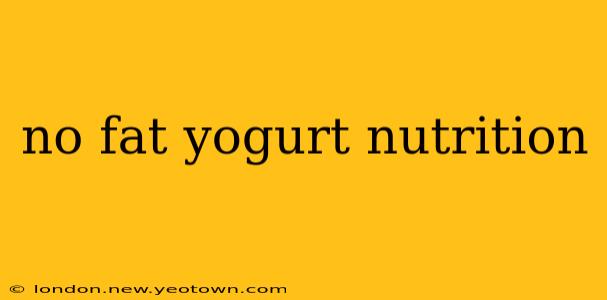Let's be honest, the idea of "no fat" often conjures up images of bland, flavorless foods. But when it comes to yogurt, that couldn't be further from the truth! No fat yogurt, often called nonfat yogurt, packs a surprising nutritional punch, making it a delicious and healthy addition to any diet. This isn't just about calories; we're talking about a powerhouse of vitamins, minerals, and probiotics that support your overall well-being.
Imagine this: a creamy, cool spoonful of yogurt, brimming with goodness, all without the extra fat. That's the promise of no fat yogurt, and we're here to explore exactly why it deserves a spot in your fridge.
What are the Nutritional Benefits of No Fat Yogurt?
No fat yogurt shines when it comes to its nutritional profile. While the fat content is significantly reduced, many essential nutrients remain. It’s a fantastic source of protein, crucial for building and repairing tissues, keeping you feeling full and satisfied. This protein boost also helps regulate blood sugar levels, preventing those energy crashes.
Beyond protein, you'll find a good dose of calcium, vital for strong bones and teeth. This is particularly important as we age and need to maintain bone density. Furthermore, many varieties are fortified with Vitamin D, enhancing calcium absorption, and Vitamin B12, essential for nerve function and red blood cell formation. Some even boast added probiotics, beneficial bacteria that support gut health and digestion.
How Many Calories are in No Fat Yogurt?
This is a question frequently asked, and the answer depends on the brand and serving size. Generally, a single serving (around 170g) of plain, nonfat yogurt contains anywhere from 50 to 100 calories. The addition of fruit, sweeteners, or other mix-ins will, of course, increase the calorie count. Always check the nutrition label for the specific product you're consuming.
Is No Fat Yogurt Good for Weight Loss?
The low calorie and high protein content of no fat yogurt makes it a smart choice for those aiming to shed some pounds. The protein keeps you feeling full, reducing cravings and overeating. It's a perfect base for a healthy breakfast, a satisfying snack, or a light dessert.
What are the Differences Between No Fat, Low Fat, and Full Fat Yogurt?
The main difference lies in the fat content. No fat yogurt has essentially zero fat, while low-fat yogurt contains a small amount (usually around 2% milk fat), and full-fat yogurt retains the natural fat content of the milk. Each option offers slightly different nutritional profiles, catering to individual preferences and dietary needs. The choice often comes down to personal preference – some people find the creamier texture of full-fat yogurt more appealing, while others prefer the lighter feel of low-fat or no-fat varieties.
Does No Fat Yogurt Have Less Protein Than Full-Fat Yogurt?
While there can be slight variations between brands, no-fat yogurt generally has a similar or slightly less protein content than full-fat yogurt. The fat removal process doesn't significantly deplete the protein. However, it's always recommended to check the nutrition facts panel to compare specific products.
Is No Fat Yogurt Good for Your Gut Health?
Many no-fat yogurts are fortified with probiotics, beneficial bacteria that support a healthy gut microbiome. A healthy gut is essential for overall health and well-being, influencing digestion, immunity, and even mood. Look for yogurts that specifically list live and active cultures on the label.
Can I Eat No Fat Yogurt Every Day?
Moderation is key with any food, including no fat yogurt. While it's a healthy and nutritious option, consuming excessive amounts could lead to consuming too much added sugar if you choose flavored varieties. Enjoy it as part of a balanced diet, incorporating a variety of other fruits, vegetables, and whole grains.
In conclusion, no fat yogurt is a versatile and nutritious food that offers numerous health benefits. Its low-calorie, high-protein nature makes it ideal for weight management, while its essential vitamins, minerals, and potential probiotic content support overall well-being. So, next time you're at the grocery store, don't shy away from this often-underestimated nutritional powerhouse! Remember to always check the nutrition label to ensure you're making an informed choice that suits your dietary needs.

